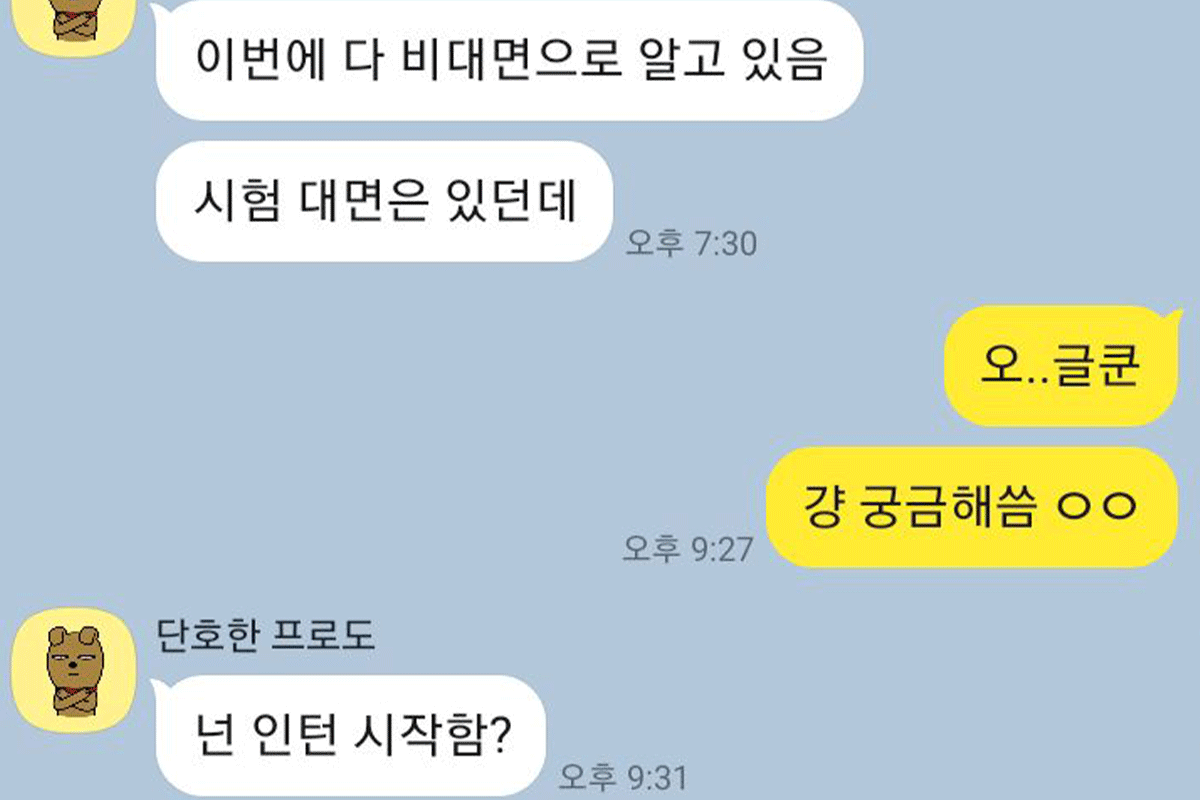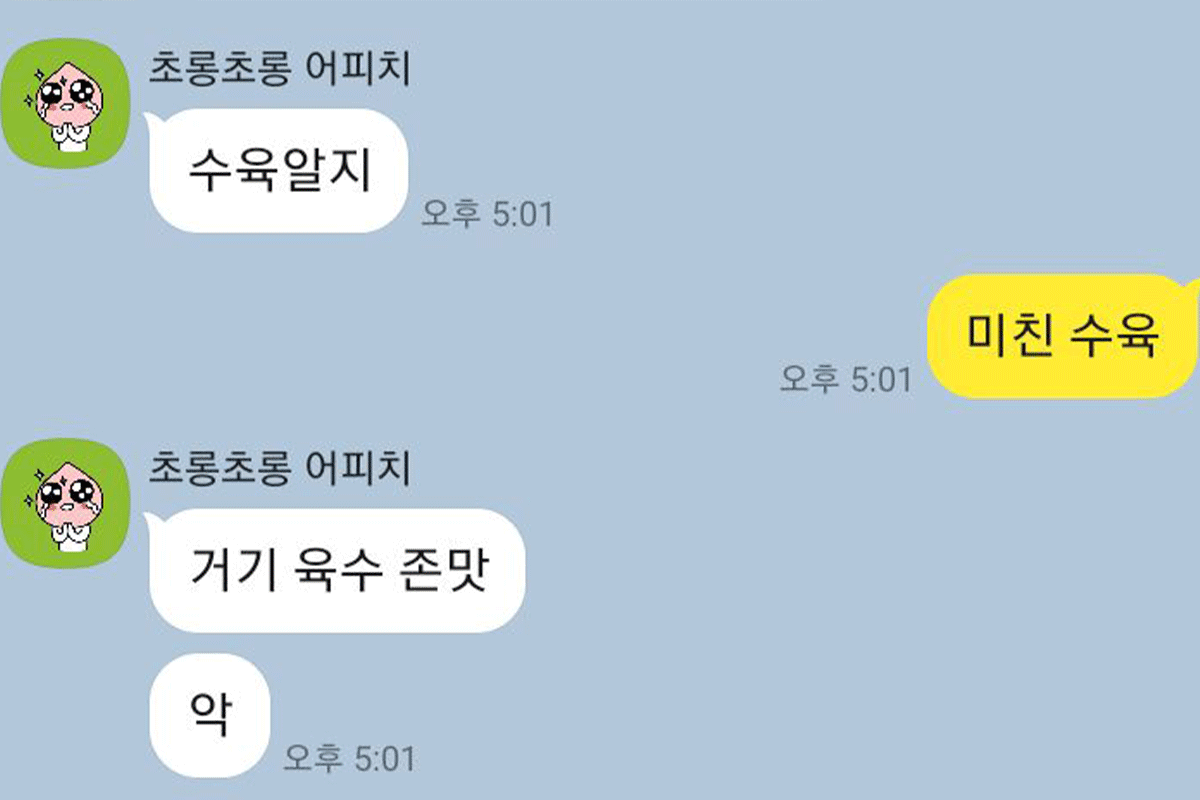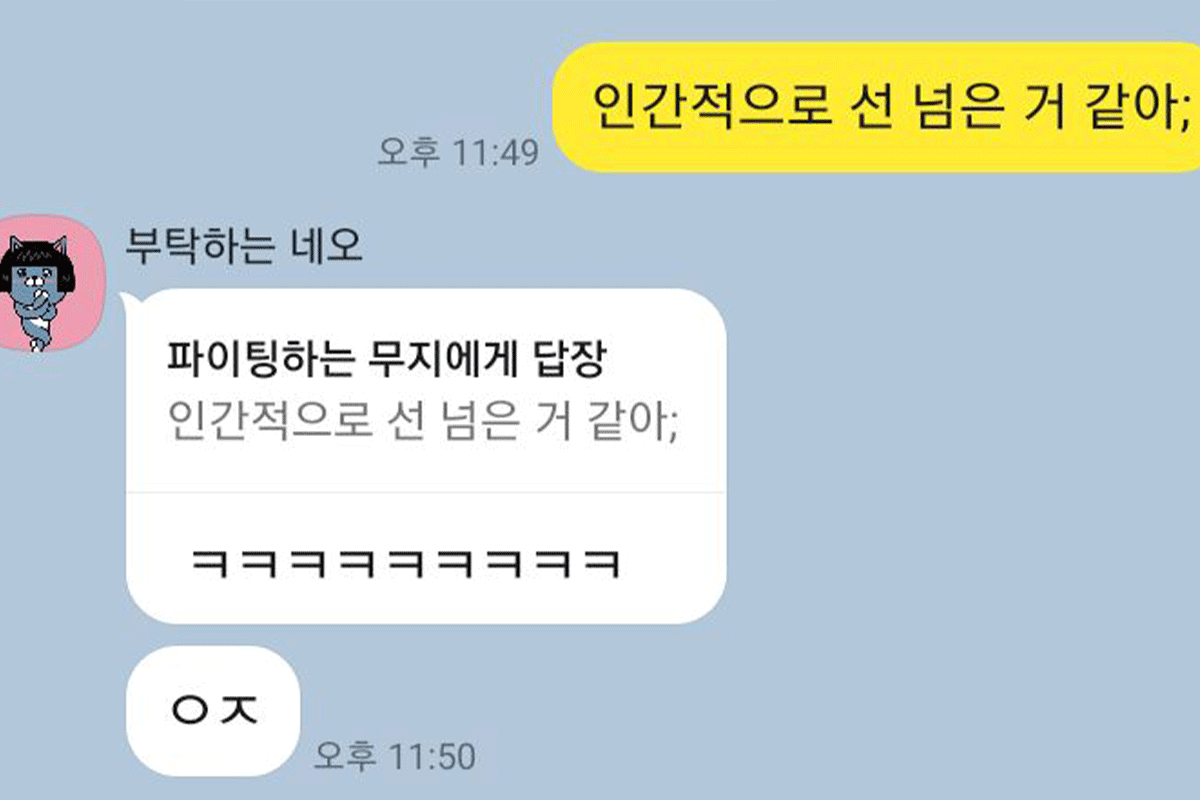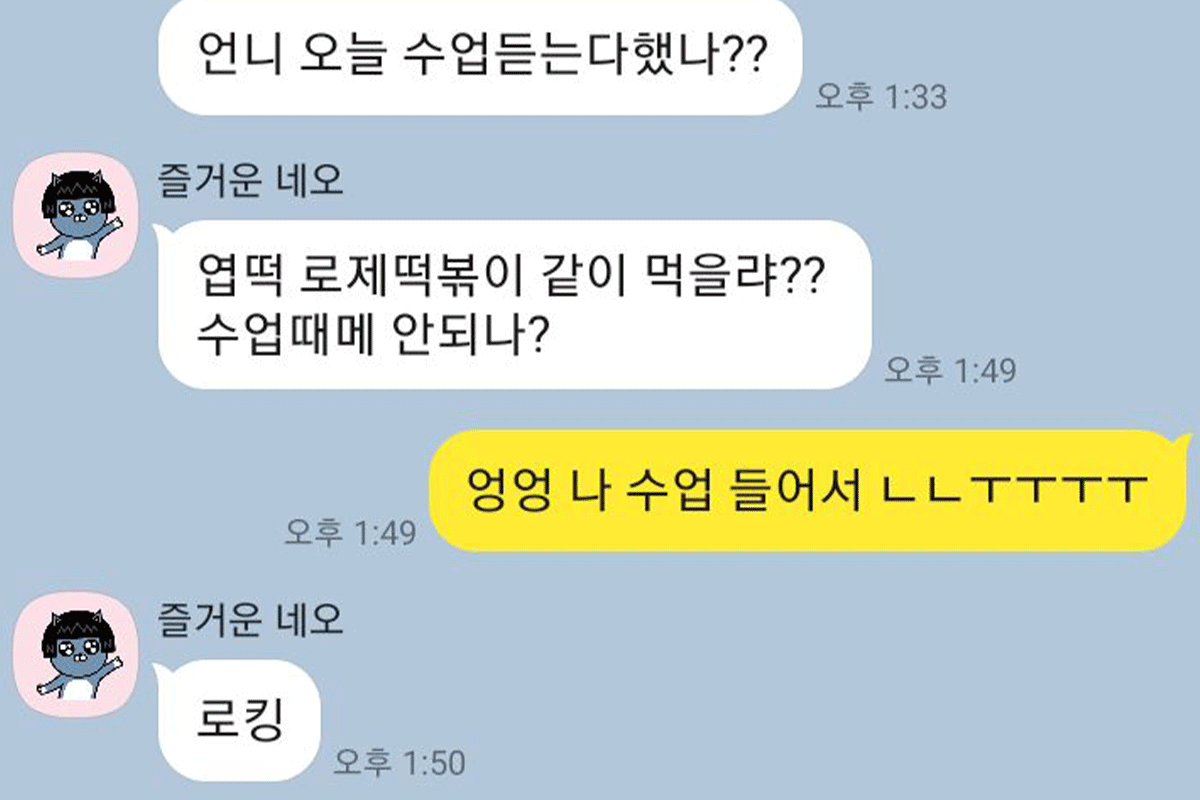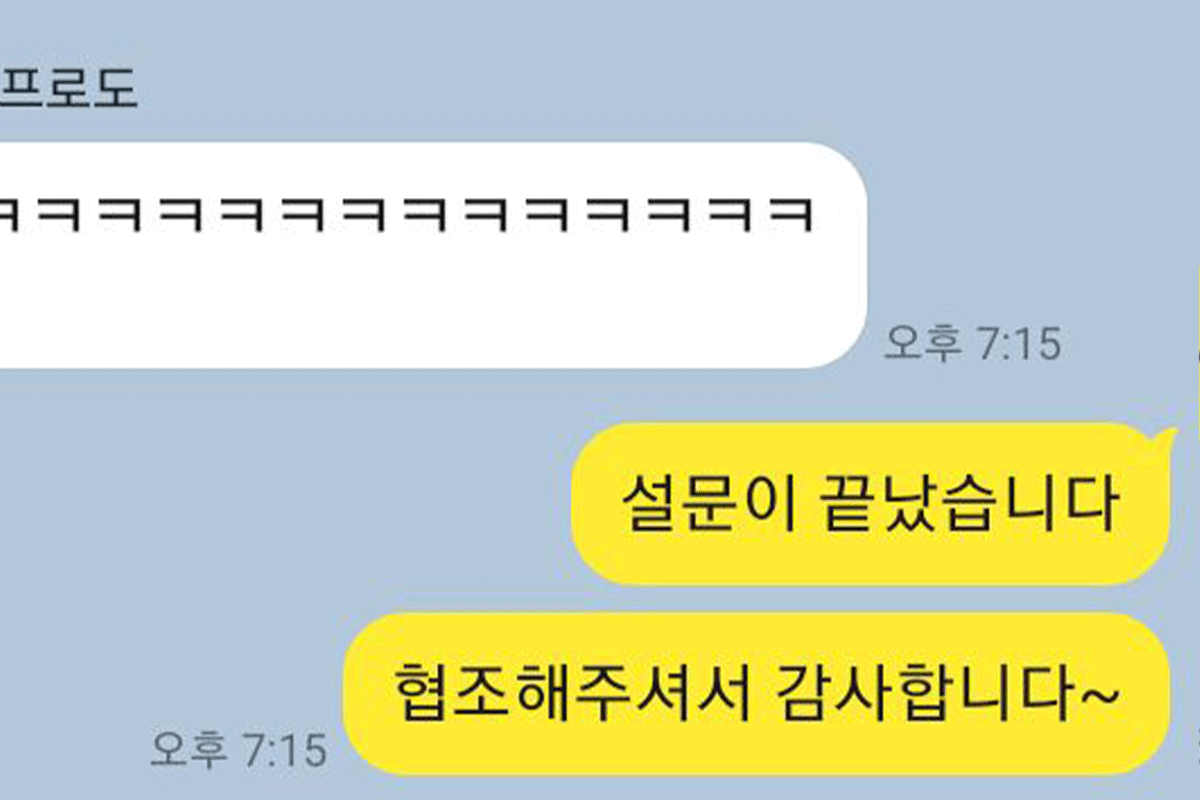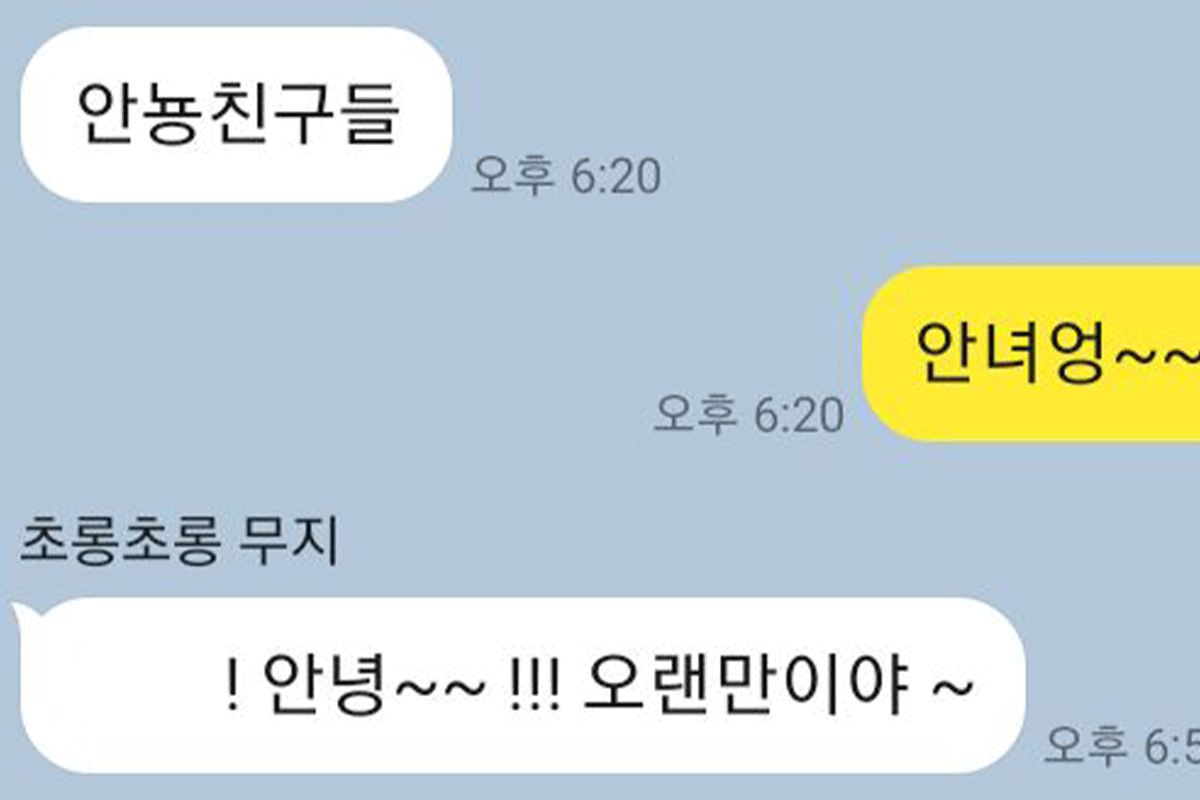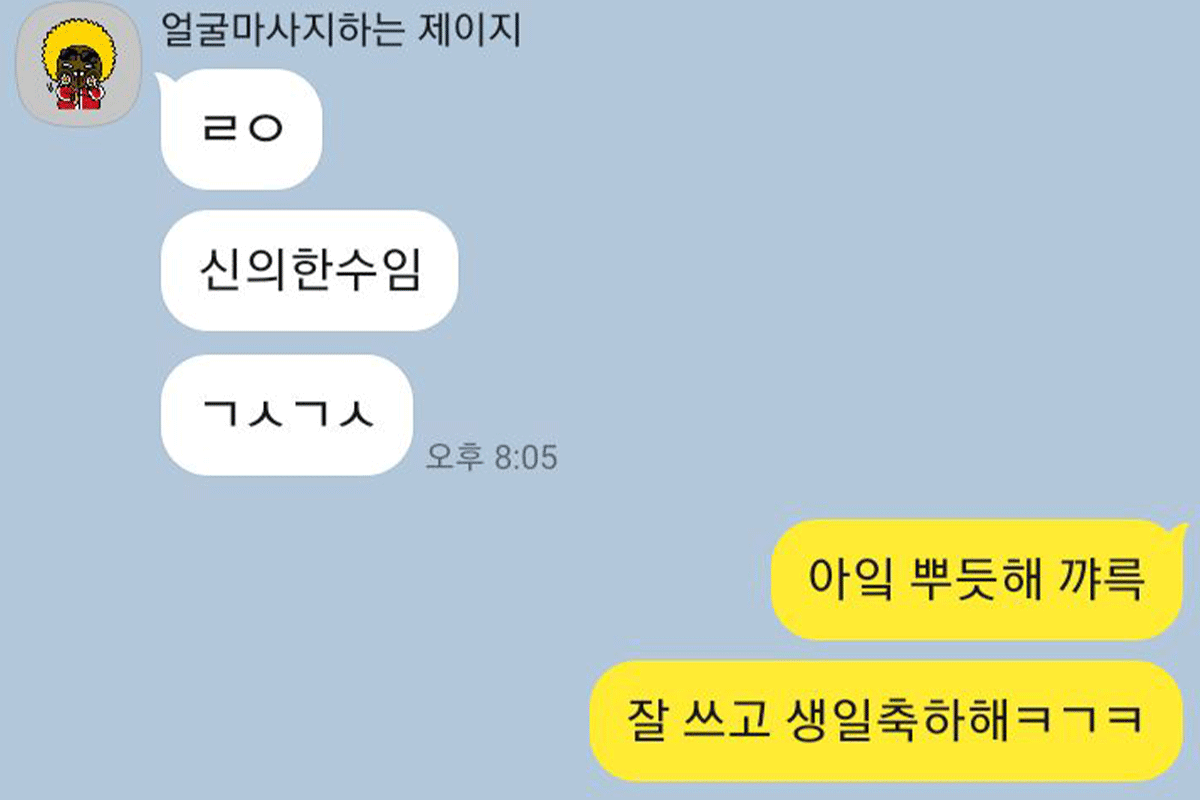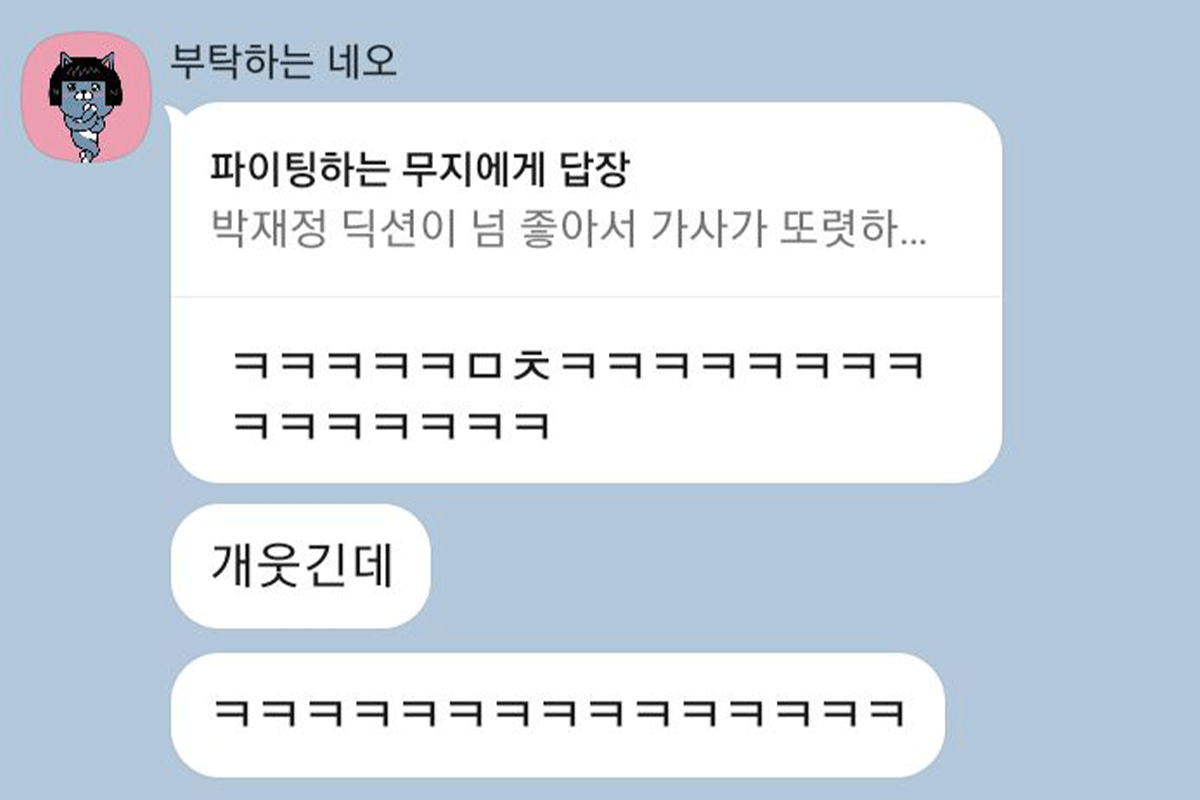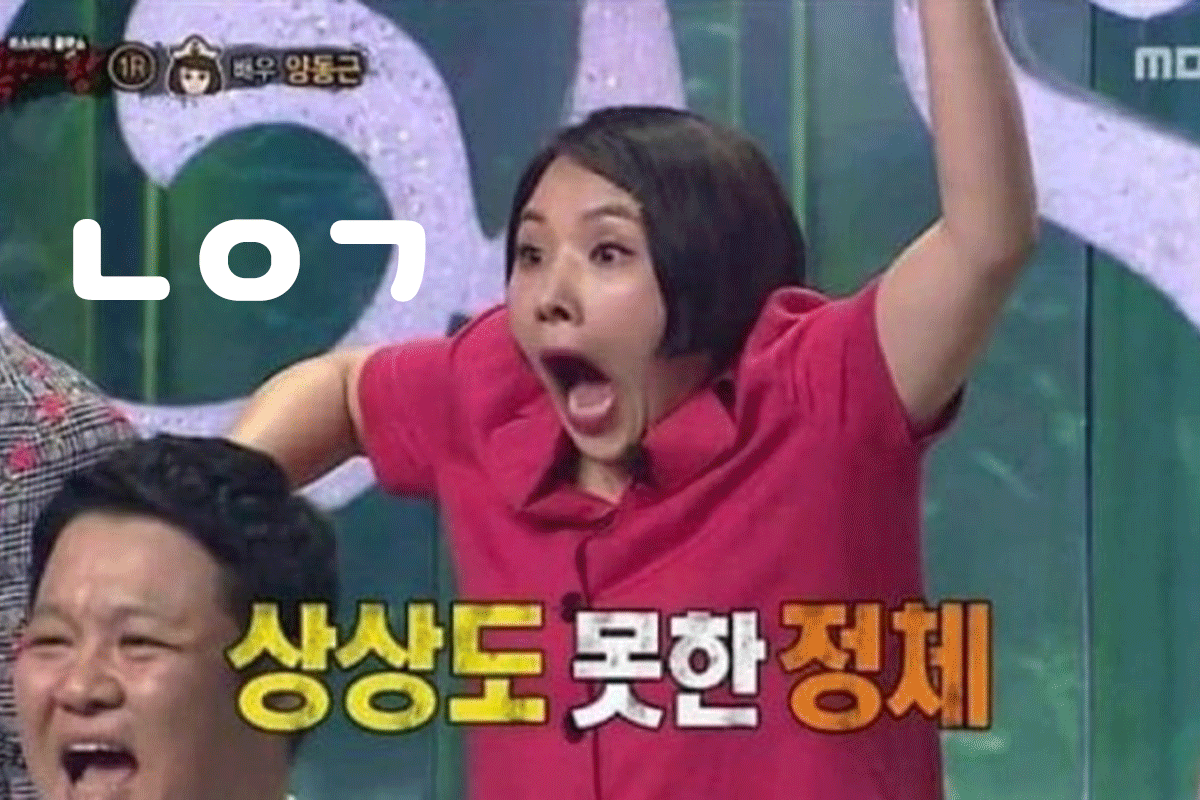Today, I'm going to explain the daily expressions that Koreans use a lot when texting on Kakao Talk!
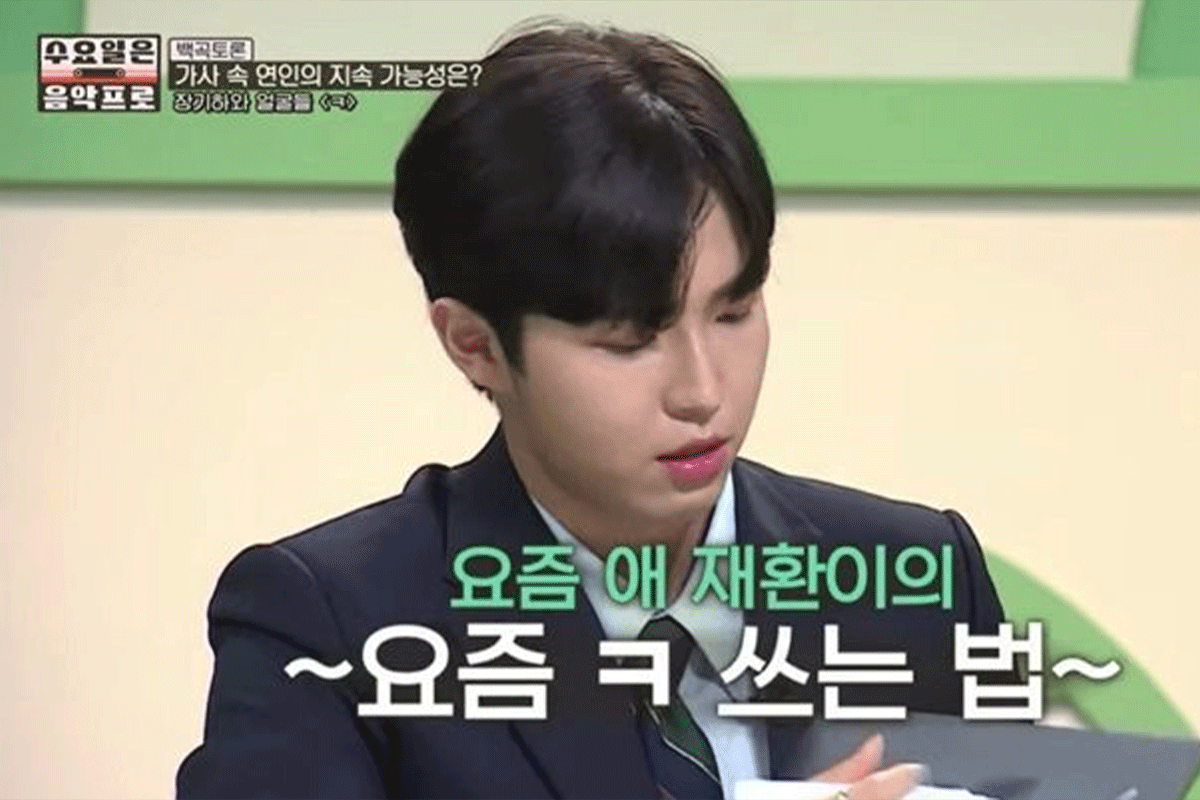
The expressions Koreans use when they talk on KakaoTalk are so diverse and very different depending on people's personalities, so I can't tell you all the expressions, but I'll tell you the expressions that are most commonly used!
Knowing these will help you understand the meaning and nuance of a conversation. However, since Korean can be very complicated, you may feel confused at first.
First, let's find out some characteristics of Korean chat terms. When chatting, the actual tone of speech or voice is not reflected, so various characters and symbols are used to compensate for these limitations.
Chatting Terms That Change The Original Expression
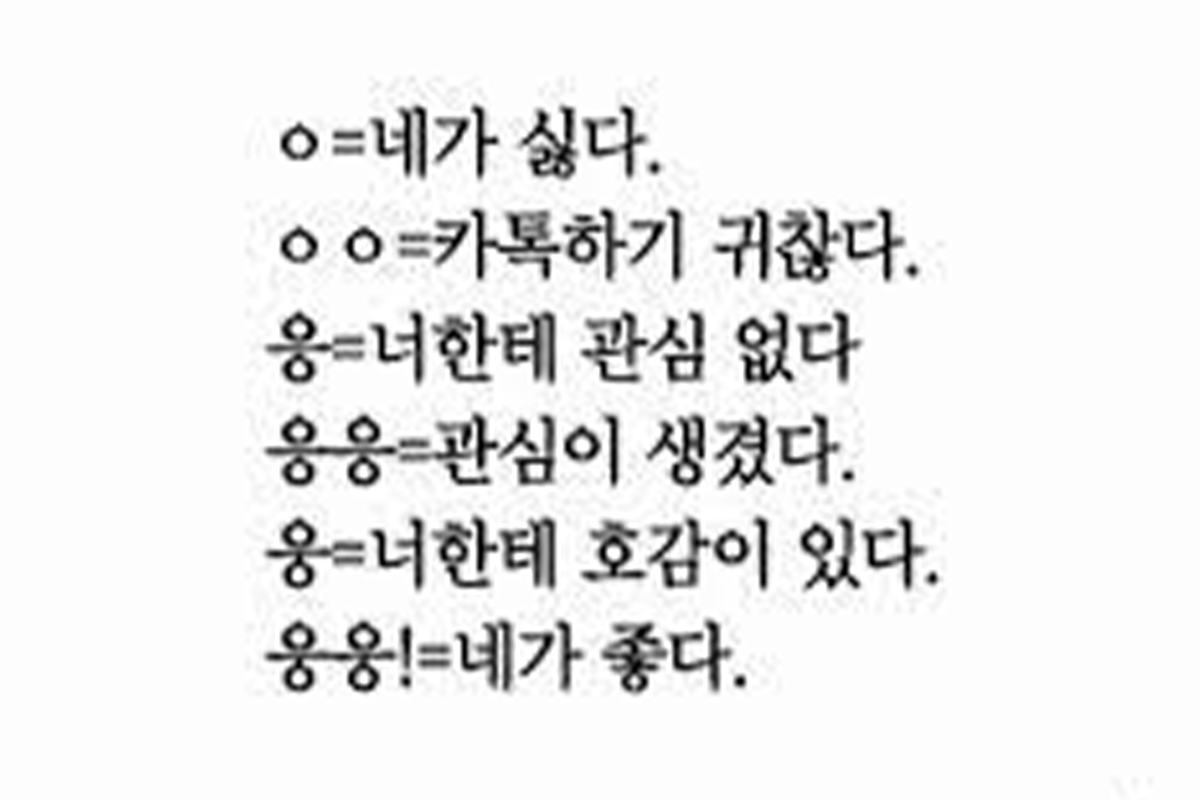
You can often see some differences in expressions used in chatting and when actually speaking. This is because if you change the word a little, it can give a softer and more friendly feeling.
Examples:
싫어 (I don't want to/No) -> 시러 : If you write "싫어" it feels like you're firmly refusing, but changing it to "시러" gives it a cuter and more casual feeling.
응 (Yes) -> 엉 /웅 (Eong / Woong) : Usually, when talking, the expression "eung" is often used, but in texts, the expression "eong" also gives a friendlier and warmer feeling. "Woong" is used to act cute.
Usually, the words are spelled slightly differently from what they actually are when someone is acting cute. Therefore, they should not be used in situations that require formal conversation such as for work or school assignment.
Adding A Consonant
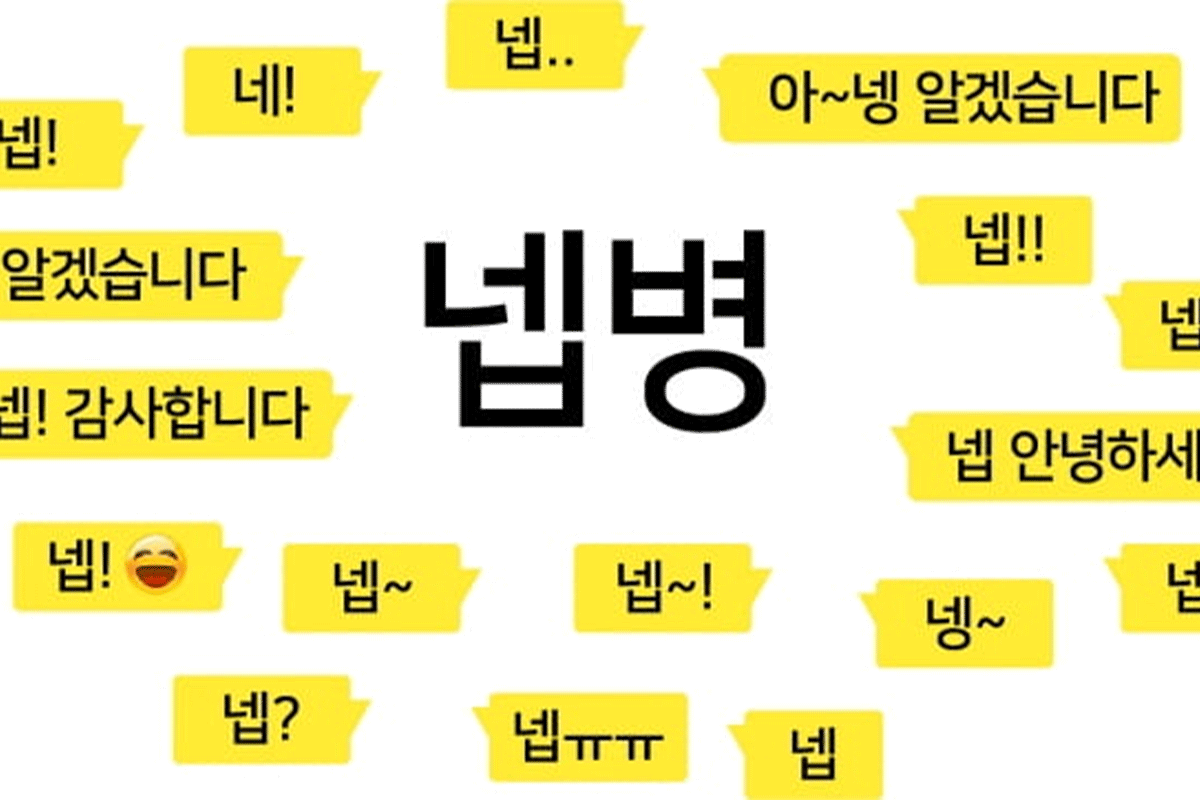
Source: 한경 CHO Insight
It's a method that's often used in a wide variety of situations. Chatting only in standard language can feel a little stiff, so people add a consonant to the last character of the verb to reduce that feeling.
However, the nuance varies depending on which consonant is attached, so let's look at various versions of "Yes" and "No."
Nae 네 | The standard language version can look firm, but it can be used in formal places, such as work. |
Aniyo 아니요 | Like "네", the standard language version can look firm, but it can be used in formal places, such as work. |
Naeng 넹 | It is much less serious than "네." It can be used between close friends, but it's not an appropriate expression in professional situations. If you also use naeng naeng (넹넹) to sound more friendly and enthusiastic. |
Aniyong 아니용 | It looks less serious with a much lighter feeling than "아니요." It can be used to keep the mood light, but it is also not suitable for formal use. |
Naeb 넵 | This is most commonly used when answering after receiving instructions at work. It's not a super firm but not too light either. However, it is often used because it gives a feeling that you have a clear understanding of the instructions. It's similar to saying yep. Naeb naeb (넵넵) sounds more enthusiastic. |
Aniyob 아니욥 | Unlike "넵," it's a little ambiguous to use at work or in an formal setting. |
Naem 넴 | It's less serious and may be misunderstood as insincere. |
Aniyom 아니욤 | It's less serious and may be misunderstood as insincere. |
The nuance changes a lot just by adding a consonant, right? The most commonly used consonants are ''ㅇ" and ''ㅂ''. "ㅇ" mainly gives a light and gentle feeling, and "ㅂ" gives a confident feeling.
However, the interpretation can differ depending on the situation and context, so these are not the only correct meanings.
In other words, the most important thing is to observe other people's chat styles and get used to various expressions by situation.
End With A Noun (Short Response)![slang koreans use when texting, kakao talk, short response]()
When changing a Korean verb to a noun, add the consonant "ㅁ". As explained earlier, it's different from adding a "ㅇ'' which seems lighter. For example, when changing the verb gan-da (간다) to gam (감).
Usually, these expressions are used casually between very close friends. This is because if you use it wrong with people you are not very close to, it may look insincere.
Example:
A: 뭐 하고 있어? (What are you doing?) B: 게임 하고 있어 (I'm playing a game.) - standard language format
A: 뭐 함? (What are you doing?) B: 게임 함 (Playing games.) - It's much simpler and shorter than the standard language format, right? That's why we call this kind of way of speaking a short answer (단답형). It can make you sound chic too so is used between close friends. However, even close friends do not use this expression often in relationships where they want a friendly tone.
Abbreviation
Among the many slang words in Korea, there are abbreviations and they are often used in chatting situations where you have to quickly type on the keyboard. However, there are so many abbreviated slang words created every year, so I can't tell you everything, but I'll tell you some of the main abbreviations.
Jonjem 존잼 | The vulgar slang jonna (존나), used to emphasize meaning, and fun (재미) are combined and shortened into two letters. It means it's very fun. |
Nojem 노잼 | No is combined with fun (재미) to mean very boring. |
Assa 아싸 | It's an abbreviation for outsider (아웃싸이더). |
Inssa 인싸 | It means insider. Originally, only 아싸 was used, but from 2017, 인싸 began to be used as meaning the opposite of an outsider. |
Jonmattaeng 존맛탱, JMT | Vulgar slang jonna (존나) is combined with delicious (맛있다) to mean very delicious. The meaning is emphasized more by adding taeng (탱) at the end, so it is also called JMT after the alphabetic initials. |
Jonmeot/Jonye 존멋/존예 | Vulgar slang jonna (존나) is combined with cool/pretty (멋지다/예쁘다) to mean very cool/pretty. |
Masang 마상 | Short for "마음의 상처", it means a wound (상처) to the heart (마음). It refers to how you feel in situations like when you asked a friend to do something but were rejected or scolded. |
Gabbunssa 갑분싸 | Short for "갑자기 분위기가 싸해졌다", it means the atmosphere (분위기) suddenly (갑자기) got chilly (싸해졌다). It's used when someone ruins the atmosphere by saying something boring or strange. |
Content that introduces Korean slang words can also be easily found on YouTube or social media.
However, not all slang words that are introduced there are often used in everyday life, so I recommend you observe what slang and expressions your Korean acquaintances usually use.
Since abbreviations are used very naturally in our daily lives, they are used in a wide variety of situations, except for very formal places. They are even used when talking to work colleagues or bosses.
However, slang words are mainly used by young people, so they don't always work when talking to older people. Also, you can't use slang using vulgar words, like jonjem, with your boss.
Consonant Initial
Abbreviations are made even shorter by using just the consonant initials. I use it very often because it's very easy and simple to keep typing one letter in a row. Like the abbreviation, it can't be used on official occasions.
Expressions Using Initials Of A Word
ㅇㅈ | Abbreviation of 인정(acknowledgment), is mainly used to agree with someone's opinion. |
ㅇㅋ | Abbreviation of 오케이 (okay) |
ㅊㅋ | Abbreviation of 축하한다 (congratulations), actual pronunciation is 'k' sound which is why ㅋ is used |
ㄱㅅ | Abbreviation of 감사 (thank you), informal so used lightly between friends |
ㅎㅇㅌ | Abbreviation of 화이팅 (fighting), used to cheer someone on |
ㅂㄹ | Abbreviation of 별로 (not good) |
ㅁㅊ | Abbreviation of 미친 (crazy), used as exclamation when surprised or angry |
ㅁㄹ | Abbreviation of 몰라 (I don't know) |
ㅈㅅ | Abbreviation of 죄송 (sorry), informal so used lightly between friends |
ㅅㄱ | Abbreviation of 수고해, no direct English translation, similar to "thank you for your work", "keep up the good work", "take care" |
If just the consonant initials are used, you can be misunderstood as being insincere, so it is best to use these casually with close friends.
Expressions Using Repeated Letters![slang koreans use when texting, kakaotalk, repeat letter]()
ㄱㄱ | From 'Go', which is 고 in Korean, and means 'Let's go!' and 'Proceed!' |
ㄴㄴ | From 'No' which is '노' in Korean. |
ㄷㄷ | From '덜덜' which is an onomatopoeia used when surprised or scared. |
ㅂㅂ, ㅃㅃ | From 'Bye', which is '바이' in Korean and '빠이' is a way to say it more cutely. |
ㅇㅇ | From '응', which is used to give a positive response (like 'yes'), and is written as ㅇ, ㅇㅇ. |
ㅊㅊ | From the first letter of '축하한다', meaning congratulations. |
ㅋㅋ | An expression Koreans use when they laugh. It has a different nuance than ㅎㅎ. (The details are explained later.) |
ㅎㅎ | An expression Koreans use when they laugh. It has a different nuance than ㅋㅋ. (The details are explained later.) |
ㅠㅠ | ㅠㅠ is an expression of tears flowing from one's eyes. The more ㅠ, the sadder they are. But, don't use it in really serious situations, such as a death or injury. For example, if you send "Ah, cheer up ㅠㅠ" to a friend who contacted you about the death of a close relative, it doesn't look serious. |
The more letters you write in a row, the stronger and more intensely you can express your feelings. For example, if you use "ㄴㄴㄴㄴㄴㄴ" instead of "ㄴㄴ," it is a very strong rejection or denial.
On the other hand, people can simply send only one letter. However, it may seem insincere. For example, if you type "ㅇ" in a situation where you have to answer 'yes', it feels cold and insincere.
Honorifics![slang koreans use when texting, kakaotalk, honorific]()
When Koreans speak to people who are older than them or strangers, they use honorifics to be polite, and use informal language with close friends. However, there are cases where honorifics are used when chatting with a person who you normally speak informally to.
For example, when a friend asks for a favor or order, you can answer '넹', '넵!', just like how you might answer at work. This is to express that you understood your friend's instructions well.
Also, they can be used when you have a favor to ask a friend. Of course, it is not essential to use honorifics with friends, it's just personal preference.
Expressions Used In Different Situations
Greetings![slang koreans use when texting, kakaotalk, greeting]()
Hello (안녕하세요) is a formal greeting in Korean that's not used often when chatting with friends. Instead, the expressions below are used:
ㅎㅇ | From "Hi" which is '하이' in Korean. |
안녕 | Annyeong is the informal version of "Hello" used when greeting friends. |
안뇽 | Annyong uses "뇽" instead of "녕" and gives off a cuter feeling. |
When Thankful![slang koreans use when texting, kakaotalk, thankful]()
고마워 /감사합니다 | Formal version |
고마웡 / 감사합니당 | Adding 'ㅇ' to the formal version gives it a more friendly feeling and you can feel the speaker's happiness and gratefulness. |
땡큐 /ㄸㅋ | From saying "Thank you" in a Korean pronunciation. Written as "땡큐" or with just the initials "ㄸㅋ". |
ㄱㅅ / ㄱㅅㄱㅅ | From the initials of "감사". It is mainly used when a friend answers a simple question or when a simple request is granted. |
감자합니다. | It's a cuter way of saying thanks. Here, "감자" (potato) isn't related to the food, but is just used to seem cuter. |
When Something Is Funny![slang koreans use when texting, kakaotalk, laughing]()
Koreans use "ㅋ" or "ㅎ" when something's funny while they chat. However, the meaning of two consonants varies a lot depending on the situation and how many are used.
ㅋ | 좋네ㅋ / 응ㅋ Good / Yes | "ㅋ" is an expression used when laughing, but if you only use one, it doesn't give such a positive feeling. There are cases where it's ambiguous to just end the conversation, so "ㅋ" is added at the end, but it slightly seems like they're laughing at the person. |
ㅋㅋ | 뭐 하냐 ㅋㅋ / 좋은데?ㅋㅋ What are you doing / Sounds good | It's used when it's slightly funny or somewhat satisfying. But "뭐 하냐ㅋㅋ" also means that the other person's behavior is absurd or a little annoying. |
ㅋㅋㅋ | 오 대박 ㅋㅋㅋ Oh, awesome | From 3 "ㅋㅋㅋ" usually means that it's really funny and satisfying. (like "LOL") |
ㅋㅋㅋ... | 개웃기다 ㅋㅋㅋㅋㅋㅋㅋㅋㅋㅋㅋㅋㅋ So funny | The more "ㅋ", the more you're laughing. |
Mixing ㅋ and ㅠ | ㅋㅋㅋㅋㅋㅋㅋㅋㅋㅠㅋㅋ픀ㅋㅋㅋㅋ큐ㅠㅋ큐ㅠㅠㅠㅠㅋㅋㅋㅋㅋㅋㅋㅋㅋㅋ큐ㅠㅠㅠㅠㅠㅠㅠ | Mixing "ㅋ" and "ㅠ" means something is so funny you're crying. Sometimes "ㅍ" or "ㄱ" is used instead because "ㅍ" is next to "ㅠ" on the Korean keyboard and "ㅋ" can be typed by pressing "ㄱ" twice. |
ㅎ | 부탁드려요 ㅎ Please ㅎ | If you put "ㅎ" at the end of a sentence, the sentence looks less empty. It's also used when asking a favor to give a friendly feeling. |
ㅎㅎ | 부탁드려요 ㅎㅎ / 잘했어 ㅎㅎ / 뭐지 ㅎㅎ Please / Good job / What is this | It sounds friendlier than "부탁드려요 ㅎ". "잘했어 ㅎㅎ" shows feeling proud of the other person. However, "뭐지 ㅎㅎ" expresses forced laughter when something is surprising or embarrassing. |
ㅎㅎㅎ | 오 나 시험 잘봄 ㅎㅎㅎㅎㅎㅎㅎ Oh, I did well on the test | Using many ㅎㅎㅎ is like "hahaha" and is used when laughing happily. It's different than "ㅋㅋㅋㅋ" because this is mostly used in humorous situations while "ㅎㅎㅎㅎ" is more like you're smiling because you feel good. |
Can you see the difference between "ㅋ" and "ㅎ"? Obviously, both are letters related to laughter, but the meaning is interpreted in a wide variety of ways depending on the situation. They're related to laughter, but it's not always interpreted positively.
Therefore, you may not have a sense of how to use it correctly, so we recommend not to use it in formal situations or when you are uncertain of how to use it. It will be very helpful to observe and adapt based on how others use it.
Emphasizing Emotion (Be Careful Of Vulgar Slang)![slang koreans use when texting, kakaotalk]()
개 | 개웃기다 ㅋㅋ / 개슬프다 ㅠㅠ / 개빨라 | In Korean, "개" means dog, but it is also used to emphasize the meaning by putting it in front of adjectives or adverbs. However, it cannot be used in a professional setting because it's a very strong expression. If my boss jokes and says something is funny "개웃기다 ㅋㅋ", the atmosphere would become awkward. |
미친, ㅁㅊ | 미친 말도 안돼 / ㅁㅊ 개멋지다 | "미친" means "Crazy", but is also used as an exclamation. You can use it when you're angry, dumbfounded, happy, or have something to celebrate. Just the initials can be used too. Again, this expression also shouldn't be used in formal settings. |
ㅈㄴ | ㅈㄴ 웃기다 / ㅋㅋㅋㅋㅋ ㅈㄴ 싫다 | It's a curse word that's often used in Korea, so it's insulting if you use it aggressively against the other person. However, close friends use it to strongly express "really". |
개웃기다 ㅅㅂ ㅋㅋㅋㅋ / 아 ㅅㅂ빡친다 / 와 ㅅㅂ 대박이다 | "시발" is the most commonly used curse word in Korea, and it, along with its initials, is also used very often in chat. This word is also like a magical word that can be used in any situation. You can use it when insulting the other person, when something's very funny, when you're very angry, when something's very admirable. |
Other Symbols And Expressions Used Often![slang koreans use when texting, kakaotalk, symbols and expressions, shin bong sun]()
. (온점) | When chatting, you don't have to put a period at the end of the sentence. They can make you feel very formal, firm, and cold. |
... | Using multiple periods gives you a softer feeling than using one. It can also give the feeling your words are trailing off, like when your voice gets smaller when you talk. When I say "죄송합니다." (I'm sorry.), it feels like I'm speaking firmly, but when I say "죄송합니다..." (I'm sorry...) I sound a little intimidated and very sorry. |
,,, | ,,, is similar to ... and is used to sound like your voice is getting smaller or to smoothly connect words in a sentence. However, it is said that using too many commas in between makes you seem old, even though many people in their mid-20s use it. |
; | ; symbolizes sweating. It's usually used at the end of sentences when I'm in a difficult situation or when I'm speechless. For example, when a friend shows two similar profile photos and asks what's better, you say, "잘 모르겠는데...;" (I don't know...;). |
~ | If you add ~ at the end of a sentence, it gives a lively feeling. When you ask for a favor, you look kinder when you say "부탁합니다~", and when you answer, "네~" feels better to read. |
^^ | It's a symbol expressing the appearance of smiling eyes. However, it is an older expression, so the younger generation uses :) more. It is also used to express a forced smile. For example, to a friend who is often late, you could say "Don't be late^^", where ^^ is like a warning. |
ㄴㅇㄱ | ㄴㅇㄱ is an expression that symbolizes a comedian's gesture when they were very surprised on an entertainment show. It's pictured above. |
So far, we have introduced various expressions used in Korean chats and various interpretations according to the situation. However, as I have mentioned many times earlier, the information I introduced today doesn't cover all the terms Koreans use and what I explained may not be applicable depending on the situationㅠㅠ
In order to use them correctly, it is important to consider the context and nuance of the conversation. At first, it may seem difficult, but you'll get the hang of it the more you use it~




